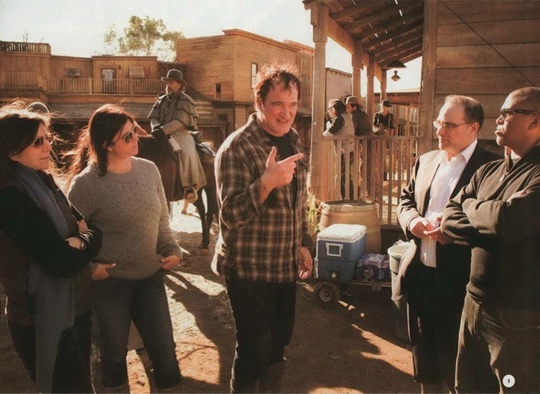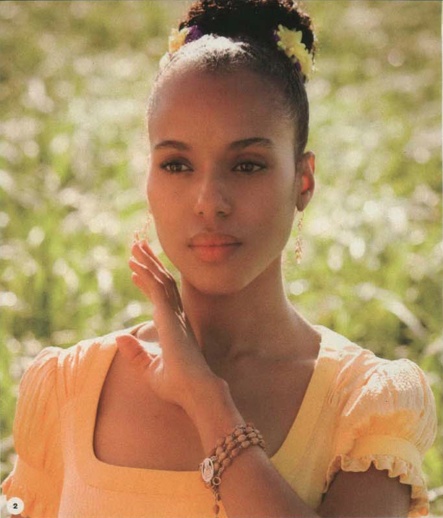Django Unchained Producer's Diary: Part II

An Inside Look at the Making of One of the Season’s Most Anticipated — and Controversial — Movies
By Reginald Hudlin From Ebony Magazine
February 2012, Jackson Hole, Wyoming
We’re high in the mountains in Jackson Hole, and it’s freezing. The temperature never gets above 12 degrees Fahrenheit, but when we first arrive on set at 5 a.m., it’s 15 degrees below zero. You have to watch your step; I moved off the path and one leg plunged waist deep in the snow. Jamie Foxx is training to be a quick-draw gunfighter. Sometimes the guns are so cold, the misfire. They have to be warmed with hair dryers to function properly. The working conditions are tough, but it doesn’t matter because the shot looks great.
February 2012, New Orleans
Quentin is very unusual in the film industry because he is "cinematically ambidextrous" — he’s as good a writer as he is a director and vice versa. He’s also a brilliant film critic. One the weekends, Quentin would screen movies for the cast and crew. It might be a classic kung fu film such as Snake in the Eagle’s Shadow; a great Black action film such as Coffey, or an early film in the career of a Django cast member, such as Return to Macon County with Don Johnson. The best part would be Quentin’s introduction of the film, during which he would provide insights into why he loved it. His observations would transform how you saw the movie. Afterward, there would be a vigorous discussion that was better than any you’d hear in a graduate film class.
February 2012, New Orleans

Kerry Washington is on set now, and she’s spending a lot of time perfecting her German. Her character in the film, Broomhilda von Shaft, grew up as the servant of German immigrants who taught her the language. This creates a special bond between her and Django’s partner and ally, the German dentist-turned-bounty hunter Dr. King Schultz. Although her language coach says she sounds great, she keeps practicing. she goes beyond the dialogue, learning a German lullaby that ends up in the film.
This is Jamie Foxx’s second film with Kerry Washington playing his wife, and their bond is evident on-screen and off-screen. Whenever she speaks German, he beams with pride. He loves the idea of Black viewers seeing a character and an actress with that much versatility.
March 2012, New Orleans
Though we had been filming for months before Samuel L. Jackson came to the set, his arrival changed the vibe on the film. He’s the actor most closely identified with Quentin’s films — especially his brilliant work in Pulp Fiction and Jackie Brown — and he’s made some type of appearance in nearly every Tarantino film. Jackson plays Stephen, the treacherous head house servant on the plantation where Broomhilda has been sold. Quentin and Samuel have a deep trust and respect for each other, similar to the relationship for each other, similar to the relationship Quentin has with Christoph Waltz who won an Oscar for his magnificent performance as Col. Hans Landa in Inglourious Basterds. To have Samuel and Christoph and Jamie and Kerry and Leonard DiCaprio — one of the biggest stars in the world — feels like an embarrassment of riches. Leonard playing a supporting role — and as the villainous plantation owner Calvin Candie, at that — is unusual for him. But he did it because of his respect for Quentin as a filmmaker and his strong feelings about racial intolerance. In conversations with him about the role, Leonardo said he wants people to understand the twisted logic that people in that era used to justify their behavior. Despite his classic movie star looks that allow him to effortlessly play roles that would have gone to Clark Gable in another era, he’s very much a member of the hip-hop generation. As each generation sheds the racial baggage of the previous one, it’s important to remember how things were so we can understand where we are.
September 2012, Los Angeles
Birth of a Nation is [studied] in film schools across America. It is a historically important film because of many of the technical innovations of the time, such as the close-up, but also because it tells the story of the rise of the Ku Klux Klan in heroic terms. While the racist politics of the film are dismissed out of hand by professors who encourage their students to focus on the filmmaking, I remember watching it and hearing my fellow students (none of whom was Black) cheering at offensive points of the film. When it screened at the White House, President Woodrow Wilson said, "It is like writing history in lightning," I think that was an apt description. Except for the history part. It’s a period film that mythologizes the most vile racism.
I thought about Birth of a Nation while watching the first hour of Django Unchained. Sitting in a converted garage-turned-editing room in a suburban neighborhood, we were transported to another time and place. For an intense hour, we alternated between suspense, all-out action, tears, laughter, pride and love. If we got all that out of the first hour, what was going to happen when we saw the whole movie?
But most of all, I thought, this movie is the anti-Birth of a Nation. Whereas Birth painted Black men as evil brutes, Django is a full human being: strong, moral, intellectually curious and courageous. In a world where Black men aren’t allowed to ride on horses because that literally elevates them, Django’s willingness to shoot straight, ride hard and talk back to White men reminds us of the great men and women of courage whose stories aren’t told but paved the way for our freedom.
